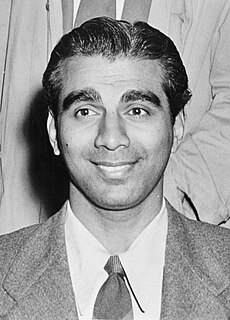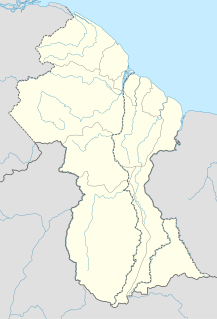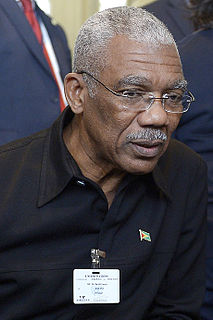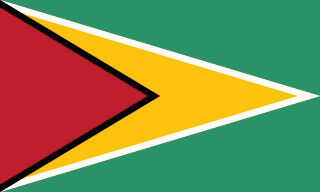
The politics of Guyana takes place in a framework of a presidential representative democratic republic, whereby the President of Guyana is the head of government and of a multi-party system. Executive power is exercised by the President, advised by a cabinet. Legislative power is vested in both the President and the National Assembly of Guyana. The judiciary is independent of the executive and the legislature.
Politics of Saint Vincent and the Grenadines takes place in the framework of a parliamentary democracy. Saint Vincent and the Grenadines is an independent Commonwealth realm, with Elizabeth II as its queen, represented by a governor-general, who acts on the advice of the prime minister and the cabinet. The prime minister is the leader of the majority party of the House of Assembly, and the cabinet conducts affairs of state. The governor-general exercises ceremonial functions, but reserve powers, under the Saint Vincent and the Grenadines constitution, can be used at the governor-general's discretion.
The recorded history of Guyana can be dated back to 1466, when Guyana de Ojeda's first expedition arrived from Spain at the Essequibo River. The history of Guyana has been shaped by the participation of many national and ethnic groups, as well as the colonial policies of the Spanish, French, Dutch, and British. The African slave rebellions in 1763 and 1823 were seminal moments in the nation's history. Africans were enslaved and transported to Guyana as slaves; in contrast, East Indians came as indentured labourers. Guyana's recent history is characterized in particular by the struggle to free itself from colonial rule, and from the lingering effects of colonialism.

Cheddi Berret Jagan was a Guyanese politician who was first elected Chief Minister in 1953 and later Premier of British Guiana from 1961 to 1964, prior to independence. He later served as President of Guyana from 1992 to 1997. He is widely regarded in Guyana as the "Father of the Nation".

Samuel Archibald Anthony Hinds is a Guyanese politician who was Prime Minister of Guyana almost continuously from 1992 to 2015. He also briefly served as President of Guyana in 1997. He was awarded Guyana's highest national award, the Order of Excellence (O.E.) in 2011.

Janet Rosenberg Jagan was the first female President of Guyana, serving from December 19, 1997, to August 11, 1999. She previously served as the first female Prime Minister of Guyana from March 17, 1997, to December 19, 1997. The wife of Cheddi Jagan, whom she succeeded as president, she was awarded Guyana's highest national award, the Order of Excellence, in 1993, and the UNESCO Mahatma Gandhi Gold Medal for Women's Rights in 1998.

Elections in Guyana take place within the framework of a multi-party representative democracy and a presidential system. The National Assembly is directly elected, with the nominee of the party or alliance that receives the most votes becoming President.

Donald Rabindranauth Ramotar is a Guyanese politician who was President of Guyana from 2011 to 2015. He was also the General Secretary of the People's Progressive Party (PPP) from 1997 to 2013.

The People's National Congress - Reform is a socialist political party in Guyana led by David A. Granger. The party currently holds 22 of the 65 seats in the National Assembly. In Guyana's ethnically divided political landscape, the PNCR is supported primarily by Afro-Guyanese people.

Moses Veerasammy Nagamootoo is a Guyanese politician and writer who has been Prime Minister of Guyana since 2015.
Geoffrey da Silva is a politician and administrator in Guyana. He was the Guyanese Minister of Trade, Tourism and Industry from 1999 to 2001 and later served as head of Guyana Investment (Go-Invest).

Carolyn Allison Rodrigues-Birkett is a Guyanese politician who served as Minister of Foreign Affairs of Guyana from 2008 to 2015.

General elections were held in Pakistan on 16 November 1988, electing the 336 members of the National Assembly and 100 members of the Senate. The Pakistan Peoples Party (PPP), led by Benazir Bhutto, beat the technocratic military government of dead General Zia-ul-Haq, winning 94 of the 207 seats in the National Assembly. This was the second of four non-consecutive victories for the PPP and saw Benazir became Pakistan's – and the Muslim world's — first female head of government. Nawaz Sharif took the office of Leader of Opposition

General elections were held in Guyana on 28 November 2011. The result was a victory for the People's Progressive Party, which won 32 of the 65 seats. Thus even though the combined parliamentary opposition, consisting of the A Partnership for National Unity coalition (APNU) and the Alliance for Change (AFC), managed to secure an absolute majority of 33 seats, as they had not run as a single list it was Donald Ramotar of the PPP who assumed the presidency, and not David A. Granger of the PNC.

Stewartville is a village district in Guyana on the Atlantic coast of West Demerara, just east of the mouth of the Essequibo River. There are four sections in the village: Stewartville Housing Scheme, Sarah Lodge, Stewartville Old Road and Stewartville Sea View.

A Partnership for National Unity (APNU) is a left-wing political alliance in Guyana.

Early general elections were held in Guyana on 11 May 2015, alongside regional elections. The result was a victory for the APNU–Alliance for Change alliance, which won 33 of the 65 seats in the National Assembly. Following the elections, APNU leader David A. Granger was sworn in as president on 16 May 2015.

General elections are currently due to be held in Guyana in early 2019 after the government of David A. Granger lost a vote of no confidence by a margin of 33–32 on 21 December 2018. The government had held a one-seat majority since the 2015 elections, but one of its own MPs, Charrandas Persaud of the Alliance for Change, voted with the opposition.















